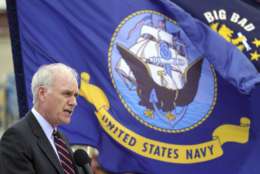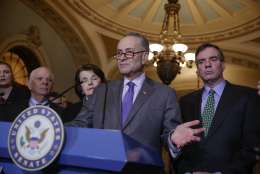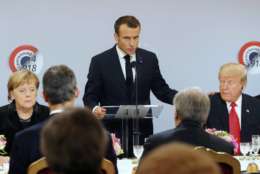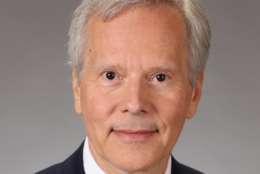China
-
A hair-raising report to Navy Secretary Richard Spencer was leaked, and it presents a grim picture of America's cybersecurity threat.
March 13, 2019 -
A bill in Congress would make sure federal employees who work in security, food service, and janitorial services, get reimbursed after the government shutdown ends.
January 07, 2019 -
Hosted by Dr. Richard Shurtz and Jim Russ. Sponsored by Stratford University. The science of champagne bubbles. And we meet the founder of China's largest mobile transportation platform, which has overtaken Uber in that country.
December 26, 2018 -
The Paris Call for Trust and Security in Cyberspace has 51 nations' signatures, but not that of the United States.
November 13, 2018 -
Rep. Barbara Comstock (R-Va.) has offered legislation to give federal employees up to 12 weeks of paid leave for the birth, adoption or foster placement of a child.
June 29, 2018 -
On this episode of CyberChat, host Sean Kelley, former EPA CISO, discusses the Chinese military’s for-profit ventures with Joshua Philipp, an investigative journalist at the Epoch Times, which covers national security and politics.
May 10, 2018 -
Parent awardee Iron Bow Technologies offered printers made by Lexmark, which is wholly owned by Chinese entities with close ties to that country's government.
April 26, 2018 -
Govini's CEO says countries, like China, are spending big on the race for artificial intelligence to improve their forward mission.
March 20, 2018 -
Christina Ho joins Gigi Schumm in the studio to remind women that you have to take the chance and follow your convictions, even if the path is unclear.
January 10, 2018 -
China and the United States have been in the race to develop the most capable supercomputer. China has announced that its exascale computer could be released sooner than originally planned. Steve Conway, VP for high performance computing at IDC, joins Federal Drive with Tom Temin for analysis.
February 09, 2017 -
With a month to go before the presidential transition, cybersecurity incidents rear up to show what a serious issue it still is.
December 19, 2016 Senate Armed Services Committee Chairman John McCain (R-Ariz.) and other members are pushing Defense officials for a definitive policy on cyber attacks.
September 29, 2015-
The Pentagon says the Chinese military threat is growing because China steals intellectual property from the United States in giant quantities. DoD's new congressional report on China details violations of U.S. copyright and export laws by Chinese intelligence programs stealing national security technology. Gordon Chang, a contributor to Forbes.com, writes their New Asia column.
June 09, 2014 -
Agents charged Bo Jiang, a contractor at the National Institute of Aerospace, with lying to federal investigators. Jiang was under investigation for possible violations of the Arms Control Act.
March 19, 2013













